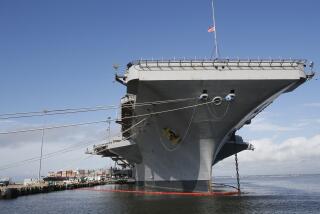Fate of Sub Crew Is in Admiral’s Hands
Moving the Greeneville disaster closer to conclusion, the admirals who presided over a court of inquiry into the deadly collision between the submarine and a Japanese fishing trawler turned over their report Friday to the commander of the Pacific Fleet.
A Navy spokesman at Pearl Harbor said that Adm. Thomas Fargo plans a decision within 30 days on what, if any, punishment to mete out to the submarine’s captain, Cmdr. Scott Waddle, and crew. The findings and recommendations of the court were not made public.
Nine Japanese crew members and students died when the Ehime Maru was struck Feb. 9 by the nuclear attack submarine nine miles off Diamond Head in Hawaii. The deaths provoked outrage in Japan.
Fargo, a former submarine captain, has a range of options, from issuing reprimands to ordering courts-martial that could lead to prison sentences.
Fargo could convene a non-judicial “admiral’s mast,” in which he would question each individual crew member and decide on penalties, including loss of rank and pay. He could refer individual crew members to a “show-cause” board to explain why they should not be dismissed from the Navy. Waddle has already been relieved of command.
Waddle’s attorney, Charles Gittins, said Waddle realizes his Navy career is finished and would accept an admiral’s mast but will plead not guilty and wage a vigorous defense if he is ordered to a court-martial.
The three admirals provided their 2,000-page report to Fargo just days after the Greeneville set to sea for the first time since the collision. After $2 million in repairs, the sub is preparing for deployment.
During the 12-day hearing, which ended March 20, testimony indicated that crew members made numerous mistakes and that Waddle failed to do a proper periscope search before surfacing.
The Greeneville smashed into the trawler while executing a rapid ascent. A sonar analyst failed to tell officers that the trawler was rapidly approaching.
At the hearing, Waddle was warned he might be charged with dereliction, negligent homicide or improperly hazarding a ship.
It is rare for captains to be ordered to stand trial for collisions at sea, even in cases where people are killed. The more common punishment is for the captain to be removed from command.
The Greeneville case has been closely watched in the Navy, including by Fargo’s predecessor, Adm. Archie Clemins, a former submarine captain, who retired in 1999. Clemins said Friday, “Personally, I don’t think there’s gross negligence. There were a lot of mistakes made, but that’s different.”
He also said that he believes Waddle’s decision to testify will work in his favor.
“Whatever mistakes he made, you have to admire him that he was willing to stand up and take responsibility,” Clemins said.
More to Read
Sign up for Essential California
The most important California stories and recommendations in your inbox every morning.
You may occasionally receive promotional content from the Los Angeles Times.









